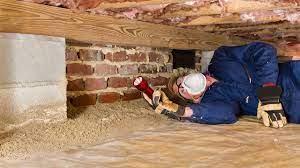As a potential homeowner, it is important to have an understanding of what a home inspector looks for during an inspection. This will help you make an informed decision when purchasing a home and will help you understand what repairs or upgrades may be necessary in the future. In this article, we will discuss the top 5 things a home inspector looks for during an inspection.

1. Introduction
A home inspection is a comprehensive examination of a property's condition, which is typically conducted before a property is sold. Home inspectors are professionals who are trained to identify potential problems and provide recommendations for repairs or upgrades. In this article, we will discuss the top 5 things a home inspector looks for during an inspection.
2. Structural Integrity
One of the most important things a home inspector looks for is the structural integrity of a property. This includes examining the foundation, walls, and roof for any signs of damage or wear and tear. A home inspector will also check for any water damage, mold, or mildew, which can be a sign of underlying structural problems.
3. Electrical System
The electrical system is another area that a home inspector will thoroughly examine. This includes checking the wiring, electrical panels, and outlets to ensure that everything is up to code and functioning properly. A home inspector will also check for any potential fire hazards, such as exposed wires or overloaded circuits.
4. Plumbing System
The plumbing system is another critical area that a home inspector will examine. This includes checking for leaks, corrosion, and water pressure issues. A home inspector will also check the water heater and ensure that it is functioning properly.
5. Heating, Ventilation, and Air Conditioning (HVAC) System
The HVAC system is essential to a property's comfort and livability. A home inspector will examine the heating and cooling systems to ensure that they are functioning properly and are up to code. A home inspector will also check for any potential carbon monoxide leaks, which can be a serious health hazard.
6. Roofing and Attic
The roof and attic are also essential areas that a home inspector will examine. A home inspector will check for any signs of damage or wear and tear, such as missing shingles or cracks in the roof. A home inspector will also check the attic for proper insulation and ventilation see also: Uncovering Hidden Problems: How a Home Inspection Can Save You Money.
7. Conclusion
In conclusion, a home inspection is an essential step in the home buying process. By understanding what a home inspector looks for during an inspection, you can make an informed decision when purchasing a property. The top 5 things a home inspector looks for during an inspection include structural integrity, electrical systems, plumbing systems, HVAC systems, and roofing and attic.
8. FAQs
Q: How long does a home inspection typically take?
A: A home inspection typically takes 2-3 hours, depending on the size of the property.
Q: Should I be present during the home inspection?
A: It is recommended that you be present during the home inspection so that you can ask any questions and address any concerns with the inspector.
Q: Can a home inspector identify all potential problems with a property?
A: No, a home inspector can only identify visible problems. There may be underlying problems that are not visible during an inspection.
Q: What should I do if the home inspection reveals problems?
A: If the home inspection reveals problems, you may want to negotiate with the seller to make repairs or offer a credit for the repairs. Alternatively, you may choose to walk away from the property if the problems are significant and costly.
Q: Can I hire my own home inspector?
A: Yes, you can hire your own home inspector. It is important to do your research and choose a reputable inspector.
Q: How much does a home inspection typically cost?
A: The cost of a home inspection varies depending on the size and location of the property. In general, a home inspection can cost anywhere from $300 to $500.
